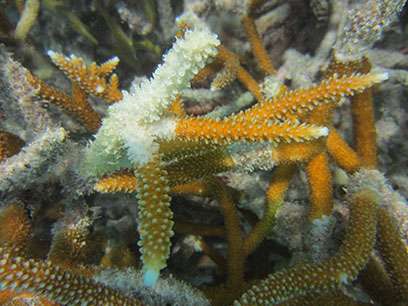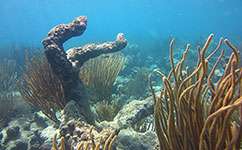Corals could be cured using probiotic like Yakult

The research, published in Proceedings of the Royal Society B, aimed to discover which microbes cause White Band Disease (WBD), which is killing corals in the Caribbean.
Diseases like WBD can erode vast stretches of coral reefs, meaning that the many species living on the reef have nowhere to feed and may die out altogether. As the oceans warm due to climate change, corals are becoming more susceptible to these diseases as they are pushed to the extremes of temperatures they can survive in. But the exact microbes, bacteria, fungi, or viruses which cause WBD have never been identified, meaning a cure was out of reach.
But now scientists have used antibiotics to slow down the spread of WBD, and in some cases halt it altogether.
'This problem has been faced by researchers for 40 odd years so we wanted to turn it on its head,' explains Dr Michael Sweet of the University of Derby, lead researcher on the project.
Previous studies looking into coral diseases have infected healthy corals with the disease to see how they were affected, but Sweet took a different approach.
'We wanted to take an already diseased coral and cure them using antibiotics,' he explains. 'Then we could analyse the microbes and through a process of elimination figure out which microbes were causing the disease.'
The team tested four different antibiotics to see how they affected the disease. Two of the antibiotics successfully treated the corals.
'The disease causing microbes we were trying to knock out, were present in the diseased coral and the antibiotic treatments which didn't cure it, but it would not be present in the healthy coral, nor the two antibiotics which cured it,' says Sweet.

The results demonstrated that WBD, at least in this instance, was caused by three different bacteria, and a micro-organism called a ciliate. It also showed that WBD is very similar to another disease called White Syndrome which affects corals in the Indo-Pacific Ocean.
'We found the disease is caused by at least three bacterial pathogens but what we don't know is if it's one of them, or all of them in a complex consortium,' Sweet explains. 'The initial bacterial infection causes the coral immune system to be hindered, reducing the number of defensive stinging cells and the amount of mucus the corals utilise to keep them healthy under normal circumstances. That's when the ciliates come in and eat the tissue. It's a bit like when you have a cold and you become more vulnerable to other diseases in the surrounding environment.'
The research highlights the importance of ciliates in coral disease, particularly a small pointy, yellow species called Philaster lucinda.
'This species burrows into the tissues of corals suffering from White Band Disease or White Syndrome, and causes the progression of the disease; enabling us to see the sharp divisions between visibly healthy coral and its exposed skeleton,' says Sweet. 'Even though it's not the primary cause of the disease, it's important as the ciliate creates the physical symptoms we use to diagnose the disease by.'
While the antibiotics successfully cured the disease, the team don't advocate dosing corals in the oceans with antibiotics as this could lead to antibiotic-resistant microbes and superbugs in the future.
Instead, the team suggest dosing corals with a probiotic.
'When a coral becomes sick not only does it gain specific pathogens it also loses its natural micro flora,' says Sweet.
Corals produce mucus similar to the micro- flora in the human stomach which, if disturbed, can make you more susceptible to disease. Probiotics are thought to restore these micro-flora.
'We'd like to try and develop a probiotic, basically like a Yakult, where you can dose a coral that has a disease with a community of healthy good bacteria and let the coral fight off the pathogen itself. If we can keep the coral happy until the environment settles down, then there's no reason we couldn't save those particular corals,' Sweet says.
The team also believes coral aquariums, which lose a significant number of their corals to disease, will benefit from using antibiotics.
'The coral aquarium trade is big business and brings in lots of income for aquariums and zoos. Now they can treat their diseased corals and reduce overall die off which will increase their profits, and reduce the amount of wild corals needed to replenish stocks. It's a win-win situation that also helps to make a more sustainable business,' he concludes.
More information: Sweet MJ, Croquer A,Bythell JC. 2014 "Experimental antibiotic treatment identifies potential pathogens of white band disease in the endangered Caribbean coral Acropora cervicornis." Proc. R. Soc. B 20140094. dx.doi.org/10.1098/rspb.2014.0094
Journal information: Proceedings of the Royal Society B
Provided by PlanetEarth Online



















